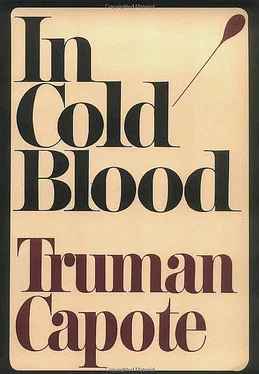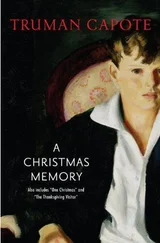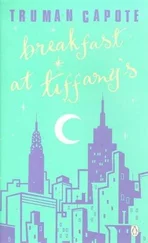The only daughter of a prosperous wheat grower named Fox, the adored sister of three older brothers, she had not been spoiled but spared, led to suppose that life was a sequence of agreeable events—Kansas autumns, California summers, a round of teacup gifts. When she was eighteen, inflamed by a biography of Florence Nightingale, she enrolled as a student nurse at St. Rose’s Hospital in Great Bend, Kansas. She was not meant to be a nurse, and after two years she confessed it: a hospital’s realities—scenes, odors—sickened her. Yet to this day she regretted not having completed the course and received her diploma—“just to prove, “as she had told a friend, “that I once succeeded at something. “Instead, she had met and married Herb, a college classmate of her oldest brother, Glenn; actually, since the two families lived within twenty miles of each other, she had long known him by sight, but the Clutters, plain farm people, were not on visiting terms with the well-to-do and cultivated Foxes. However, Herb was handsome, he was pious, he was strong-willed, he wanted her—and she was in love.
“Mr. Clutter travels a great deal,” she said to Jolene. “Oh, he’s always headed somewhere. Washington and Chicago and Oklahoma and Kansas City—sometimes it seems like he’s never home. But wherever he goes, he remembers how I dote on tiny things.” She unfolded a little paper fan. “He brought me this from San Francisco. It only cost a penny. But isn’t it pretty?”
The second year of the marriage, Eveanna was born, and three years later, Beverly; after each confinement the young mother had experienced an inexplicable despondency—seizures of grief that sent her wandering from room to room in a hands wringing daze. Between the births of Beverly and Nancy, three more years elapsed, and these were the years of the Sunday picnics and of summer excursions to Colorado, the years when she really ran her own home and was the happy center of it. But with Nancy and then with Kenyon, the pattern of postnatal depression repeated itself, and following the birth of her son, the mood of misery that descended never altogether lifted; it lingered like a cloud that might rain or might not. She knew “good days,” and occasionally they accumulated into weeks, months, but even on the best of the good days, those days when she was otherwise her “old self,” the affectionate and charming Bonnie her friends cherished, she could not summon the social vitality her husband’s pyramiding activities required. He was a “joiner,” a “born leader”; she was not and stopped attempting to be. And so, along paths bordered by tender regard, by total fidelity, they began to go their semi-separate ways—his a public route, a march of satisfying conquests, and hers a private one that eventually wound through hospital corridors. But she was not without hope. Trust in God sustained her, and from time to time secular sources supplemented her faith in His forthcoming mercy; she read of a miracle medicine, heard of a new therapy, or, as most recently, decided to believe that a “pinched nerve” was to blame.
“Little things really belong to you,” she said, folding the fan. “They don’t have to be left behind. You can carry them in shoebox.”
“Carry them where to?”
“Why, wherever you go. You might be gone for a long time.”
Some years earlier Mrs. Clutter had traveled to Wichita for two weeks of treatment and remained two months. On the advice of a doctor, who had thought the experience would aid her to regain “a sense of adequacy and usefulness,” she had taken an apartment, then found a job—as a file clerk at the Y.W.C.A. Her husband, entirely sympathetic, had encouraged the adventure, but she had liked it too well, so much that it seemed to her unchristian, and the sense of guilt she in consequence developed ultimately outweighed the experiment’s therapeutic value.
“Or you might never go home. And—it’s important always to have with you something of your own. That’s really yours.”
The doorbell rang. It was Jolene’s mother.
Mrs. Clutter said, “Goodbye, dear,” and pressed into Jolene’s hand the paper fan. “It’s only a penny thing—but it’s pretty.”
Afterward Mrs. Clutter was alone in the house. Kenyon and Mr. Clutter had gone to Garden City; Gerald Van Vleet had left for the day; and the housekeeper, the blessed Mrs. Helm to whom she could confide anything, did not come to work on Saturdays. She might as well go back to bed—the bed she so rarely abandoned that poor Mrs. Helm had to battle for the chance to change its linen twice a week.
There were four bedrooms on the second floor, and hers was the last at the end of a spacious hall, which was bare except for a baby crib that had been bought for the visits of her grandson. If cots were brought in and the hall was used as a dormitory, Mrs. Clutter estimated, the house could accommodate twenty guests during the Thanksgiving holidays; the others would have to lodge at motels or with neighbors. Among the Clutter kinfolk the Thanksgiving get-together was an annual, turnabout to-do, and this year Herb was the appointed host, so it had to be done, but coinciding, as it did, with the preparations for Beverly’s wedding, Mrs. Clutter despaired of surviving either project. Both involved the necessity of making decisions—a process she had always disliked, and had learned to dread, for when her husband was off on one of his business journeys she was continually expected, in his absence, to supply snap judgments concerning the affairs of the farm, and it was unendurable, a torment. What if she made a mistake? What if Herb should be displeased? Better to lock the bedroom door and pretend not to hear, or say, as she sometimes did, “I can’t. I don’t know. Please.”
The room she so seldom left was austere; had the bed been made, a visitor might have thought it permanently unoccupied. An oak bed, a walnut bureau, a bedside table—nothing else except lamps, one curtained window, and a picture of Jesus walking on the water. It was as though by keeping this room impersonal, by not importing her intimate belongings but leaving them mingled with those of her husband, she lessened the offense of not sharing his quarters. The only used drawer in the bureau contained a jar of Vick’s Vaporub, Kleenex, an electric heating pad, a number of white nightgowns, and white cotton socks. She always wore a pair of these socks to bed, for she was always cold. And, for the same reason, she habitually kept her windows closed. Summer before last, on a sweltering August Sunday, when she was secluded here, a difficult incident had taken place. There were guests that day, a party of friends who had been invited to the farm to pick mulberries, and among them was Wilma Kidwell, Susan’s mother. Like most of the people who were often entertained by the Clutters, Mrs. Kidwell accepted the absence of the hostess without comment, and assumed, as was the custom, that she was either “indisposed” or “away in Wichita.” In any event, when the hour came to go to the fruit orchard, Mrs. Kidwell declined; a city-bred woman, easily fatigued, she wished to remain indoors. Later, while she was awaiting the return of the mulberry pickers, she heard the sound of weeping, heartbroken, heartbreaking. “Bonnie?” she called, and ran up the stairs, ran down the hall to Bonnie’s room. When she opened it, the heat gathered inside the room was like a sudden, awful hand over her mouth; she hurried to open a window. “Don’t!” Bonnie cried. “I’m not hot. I’m cold. I’m freezing. Lord, Lord, Lord!” She flailed her arms. “Please, Lord, don’t let anybody see me this way.” Mrs. Kidwell sat down on the bed; she wanted to hold Bonnie in her arms, and eventually Bonnie let herself be held. “Wilma,” she said, “I’ve been listening to you, Wilma. All of you. Laughing. Having a good time. I’m missing out on everything. The best years, the children—everything. A little while, and even Kenyon will be grown up—a man.
Читать дальше












